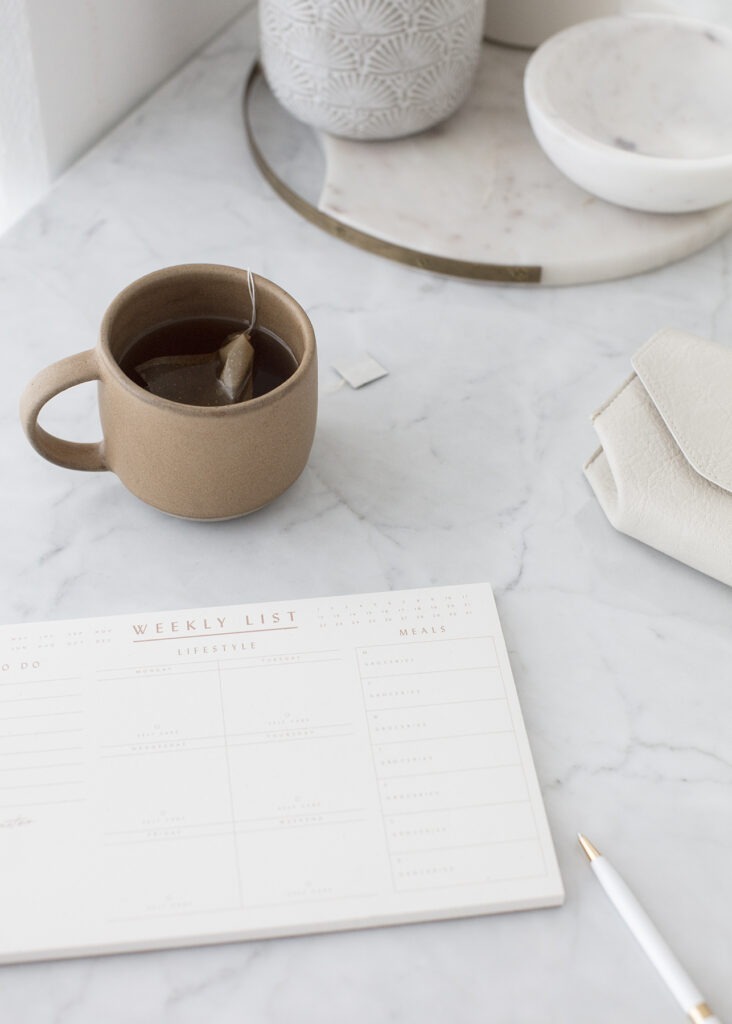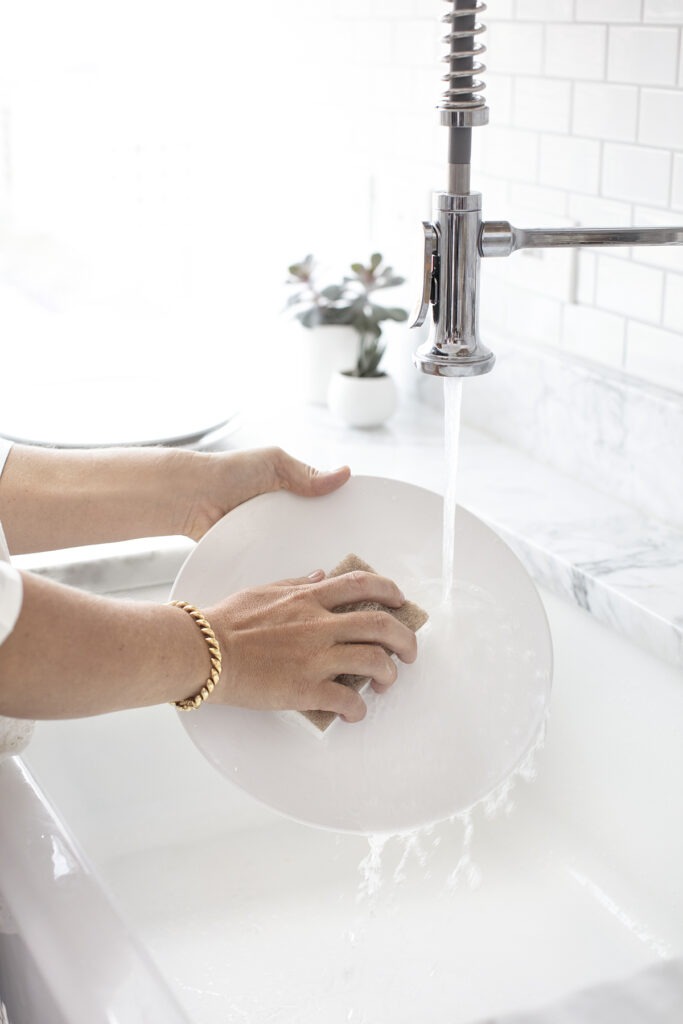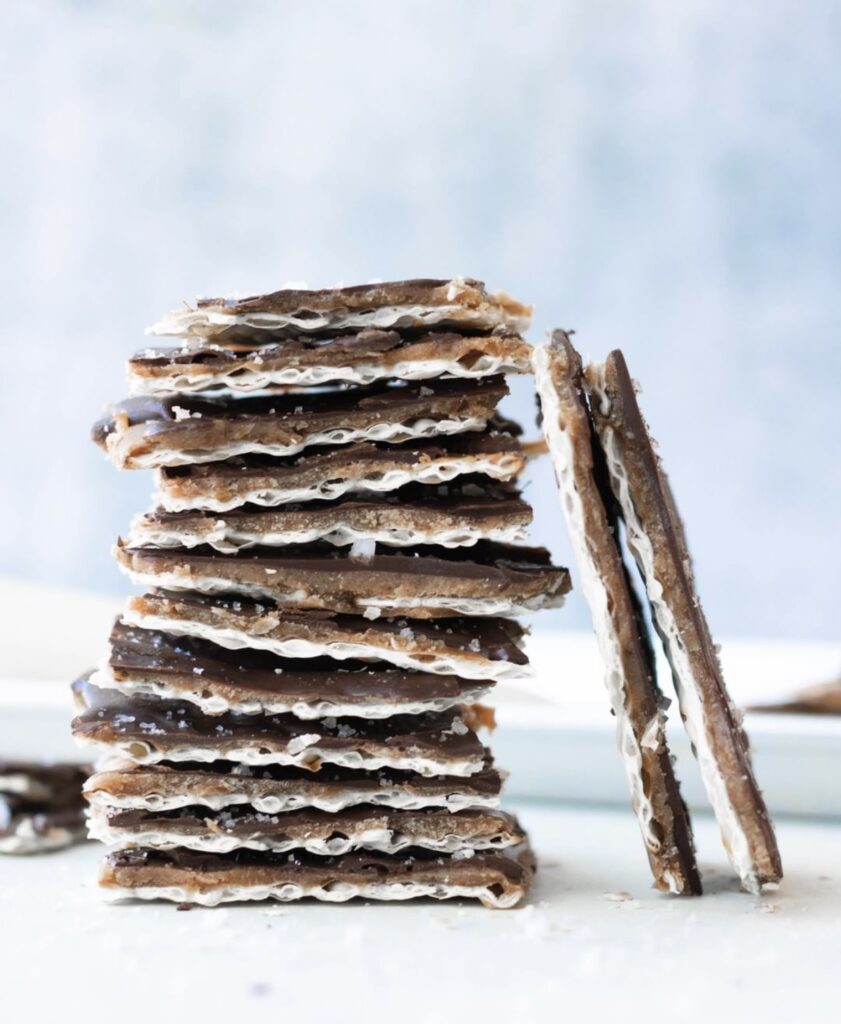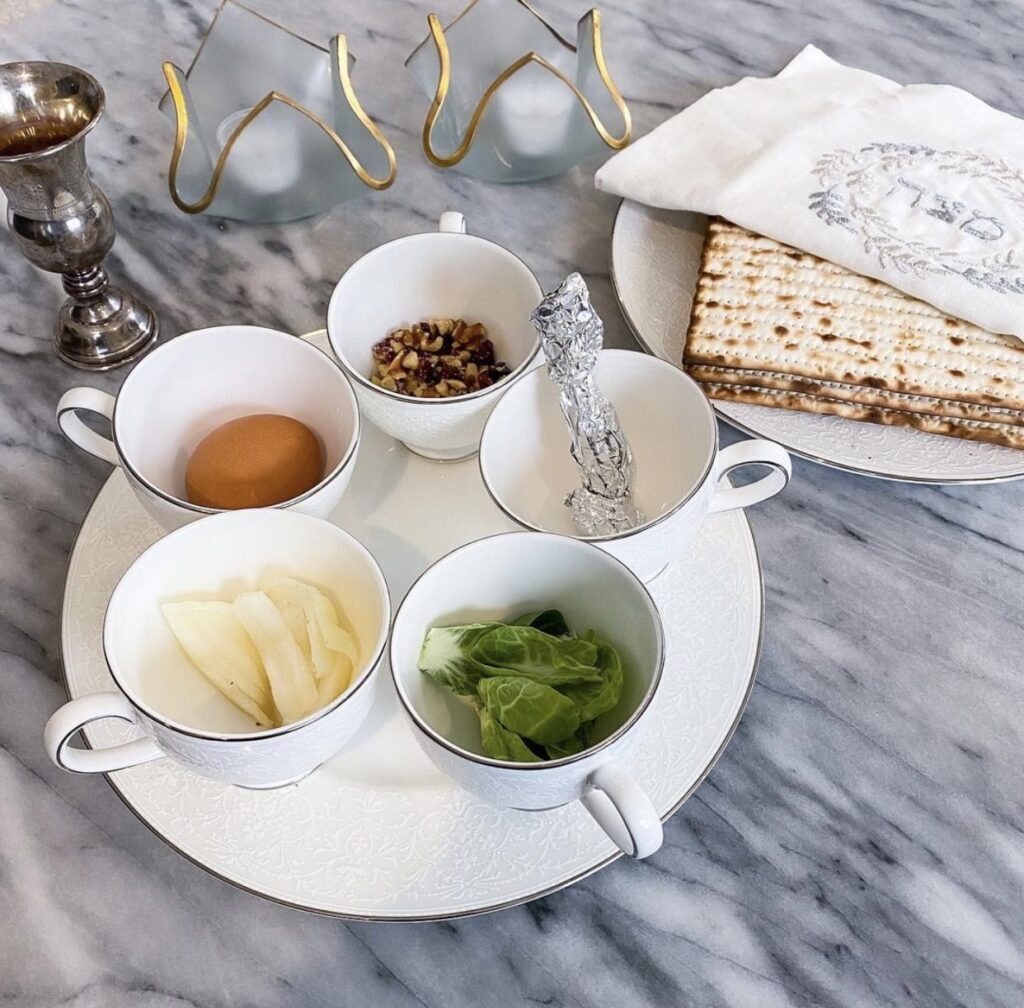It seems like the second Purim is over, the Pesach fear sets in in. The tasks start piling up in your mind to the point of overwhelm. Between kashering pots and utensils, shopping for food, cleaning, turning over the kitchen, remembering and learning halachot, figuring out what to make and then actually cooking it all, it’s no wonder so many women are sent straight into a state of panic at the thought of preparing for this holiday.
Yes, there is a lot going on, but it’s important to remember that it is indeed, a holiday. It’s a time to be joyous as we celebrate our freedom as Jews. We don’t want to be so overwhelmed by the preparation that we lose sight of what we’re actually doing it all for.
As a new Pesach maker, I have definitely been a slave to the overwhelm. This year though, I am determined to do things differently. I want to go into Pesach excited, alive and b’simcha (happy) versus just feeling dread at the amount of work that needs to get done. To do so, I set out to speak to some of the pros (a.k.a awesome Jewish power women who have been doing this for years). Read on below for their life-changing advice!
THE PREP
Make a schedule.
“If you like to write things down, you can work backwards and make a rough schedule of all your cooking and cleaning tasks. That way you know you have everything planned out and will get to it at the right time. You’re not left wondering when everything will get done and can check in that you’re on track. It will feel so much less overwhelming.” —Lauren
Start doing small things now.

“One of the quickest and easiest ways to beat overwhelm is to break things down into smaller steps. First, figure out how many people are coming over. Then, once you know that you can make a menu. Once you have a basic menu set, you can write down some ingredients you’ll need. Starting small and going step by step will help you feel more prepared and like you’re already ahead of the game.” —Leigh
“As you write things down, differentiate between what you would like to do and what you have to do. This way you don’t fall into the trap of getting in over your head with unnecessary prep work but can do so if you have time.” —Mariam
“Write down things that need to be done last minute so you don’t forget like changing your toothbrush and mouthwash, cleaning or changing the broom, emptying the vacuum cleaner and jacket pockets.” —Mariam
“Make a lot of lists. Once you have all these tasks down and on paper, you get them out of your head, which is already stress-relieving. Make a list of everything you need to clean in the house, going room by room. Make a list of other Pesach-related tasks, like toveling new dishes, getting your sheitel washed, and so on. Make shopping lists for food, housewares, clothing, etc. And save all these lists on your computer so you can use them from year to year.” —Malka
Go shopping little by little.
“Right after Purim, I’ll start shopping for clothing for the kids. This way I’m not running around when everyone else is and everything is still available. Spacing out the clothing and food shopping also so you’re adding things slowly is easier on your bank account as well.” —Basha
“Start with the non-perishables. Just starting to pick up a few at each shopping trip will make it easier to organize and bring home.” —Shifra
“The first thing I clean is a space where I can put my Pesach purchases. That way, I don’t have to worry about where I’m going to put them when I buy them, nor do I have to worry about keeping them “safe” from any chametz (bread products) that may stray into the area.” —Malka
Pretend you’re going on a trip.
“You don’t need a new pot and pan of every size for meat, dairy and pareve. Just get the basics. Pretend you’re going on a trip for a week—what would you bring? You can get one dairy frying pan for eggs, one soup pot, one meat frying pan, a spatula for each, etc. The week goes by very quickly so you can get by on very little. You can then build it up year after year as needed.” —Lauren
THE CLEANING
Don’t go crazy with the cleaning.
“You may have heard this one, but it does bear repeating. Pesach cleaning is not spring cleaning. The law is not to spring clean. The law is to get rid of chametz and chametz is not dust. Knowing exactly what you have to do will help you ease into it and not get overwhelmed doing things that don’t actually have to do.” —Shifra
“I know many women who start with the most important parts first (like the kitchen and dining room) and do those while they have more energy. Or they at least clean their fridge, freezer and pantry to know they’re done. Afterward, if they still have time and energy, they do the less important rooms, like bedrooms.” —Malka
Keep track of your progress.

“If you start cleaning earlier, you can do it really slowly. Just do one room or closet at a time and then when you’re done, put a sticky note on it that says, ‘Clean for Pesach.’ That way you remind yourself and anyone you’re living with not to bring chametz there. You’ll also be encouraged by the progress you’ve made!” —Mariam
You don’t actually have to clean everything.
“You can tape up some of your cabinets with chametz you’re going to sell, and just clean out a few of them for Passover stuff. You can do the same in your fridge and just tape and cover one shelf with products you won’t be using. This way, you’ll also create less waste by not throwing everything out.” —Shifra
“Many people have a separate portable cabinet or shelves that they put together right before Pesach and use instead of their kitchen cabinets. This saves a lot of cleaning, emptying and restocking work. In the same vein, some people have couch covers, garbage cans, jewelry and other stuff they use just on Pesach which saves a lot of cleaning trouble, too.” —Malka
Enlist help.
“Hire help if you can! Even if you’re not bringing in a professional cleaning service, a teenaged helper can be a tremendous help when it comes to cleaning a fridge or cabinets.” —Malka
Swap out your pocketbook.
“If you have a second bag, you don’t have to go crazy cleaning it out. Just take out the important things and find another bag to put everything in. That will save some time.” —Leigh
THE FOOD
Take notes.
“I keep a Pesach notebook that comes with me from year to year. You could do it on a computer also, but I like to write things down. I divide it into sections of recipes, things I need to buy, things that worked or didn’t work from the year before, etc. This way I can be really organized and see everything in front of me. I’ll sit down one day with a cup of coffee and just go through it slowly.” —Basha
Store your recipes from year to year.
“I bought a soft small photo album that holds about 20 5×7 pictures. I bought a pack of 5×7 index cards and when I find a good recipe, I’ll write it down on one and store it in the album. I love how accessible the recipes are this way—they don’t get dirty in the plastic sleeves—and they’re easy to keep using each year.” —Leigh
“A three-ring binder with page protectors or a folder with laminated pockets works really well for organizing recipes you tear out of magazines or print off the computer.” —Malka

Make foods you’re already comfortable with.
“When deciding what to cook, I’ll just think of my go-to menu and then supplement anything chometz with an alternative. So instead of rice, I’ll make quinoa. A lot of other stuff like meat, soup, salmon, chicken, salads and potatoes I can do the same way. Generally doing what I normally do makes the food prep way less stressful.” —Rachel
Invest in an electric burner.
“These are awesome. I made two full Seders on them for several years. They’re great if you can’t or don’t want to kasher your stove top, or just want more space to cook. Definitely a worthwhile purchase.” —Lauren
Try a crock pot.
“If you don’t have a Pesach kitchen and want to cook before your kitchen is fully kosher for Pesach, use a crockpot in a little area. You can make brisket or chicken in there early on and freeze it.” —Lauren
Keep making that freezer space.
“I sauté a huge amount of onions before I start cooking and freeze them in small amounts in ziplock bags. I’ll freeze and label a lot of food in ziplock freezer bags to save space also like roasts, apple sauce and cakes. You can freeze soup bags laying flat on a cookie sheet to save space.” —Mariam
Don’t forget about Erev Pesach...
“Having a one-pan meal on-hand for erev Pesach is a great idea. Everyone is starving that day and it’s helpful to have something nourishing and filling ready-to-go or easy to put together so it doesn’t add to your stress.” —Lauren
…or the Seder plate!
“If you’re making your own Seder, don’t forget about all the items you’ll need for your Seder plate. They’re often easy to forget because they’re not an official part of your menu.” —Malka
Try out binding substitutes.
“If you don’t want to use matzoh meal, bind meatballs with ground almonds or other nuts or potato flakes. You can also bread schnitzel with them.” —Shifra
THE SEDER
Catch some zzz’s if you can.
“Really try to take a nap on Erev Pesach. It makes Seder night so much more enjoyable if you aren’t falling on your face with exhaustion!” —Malka
Remember you don’t need that much food.
“The seder is late, so when you get to the meal people don’t even want to eat that much. You can just do soup, one main and two sides. Keep it simple.” —Leigh
Enhance your seder experience with a beautifully crafted seder plate. A stunning seder plate not only adds elegance to your table but also enriches the ceremonial aspect of the evening, making the retelling of the Exodus story even more engaging for your guests.

Have fun with it.
“Every year I like to get one new item for the seder like finger puppets, plastic frogs or a Pesach memory game and figurines. Adding something whimsical makes it a lot more fun. One year when we had a lot of guests, I bought cute but nice little prizes for Pesach trivia we did at the seder. I went to H&M and bought things that were not expensive but also not junky so people would actually want to use them and get excited.” —Leigh
Do what works for you.
“Pesach looks different for every woman. Don’t feel pressured to do what another person is doing. However you release your tension or you feel connected to the holiday is the right thing. Everyone doing it their own way creates the beauty of klal Yisrael.” —Basha
Remember you’re doing something holy.
“I really enjoy feeding my family and spending Yom Tov with them so I know what I’m doing is a means to an end. It may seem mundane, but what is more worthwhile and holy than changing diapers, raising children and creating a Jewish home? The act of cleaning and ridding our home of chametz also reminds me of the introspection and self-work we can do to cleanse our souls.” —Mariam
“Pesach looks different for every woman.”
Have a goal outside of cooking and cleaning.
“It’s important to not lose sight of the fact that it’s Pesach and not just one big 3-day cookfest. Of course you do have to get things done, but trying to stick in one goal of something spiritual you can bring to the seder is really helpful. Maybe it’s just reading one dvar Torah or listening to a shiur while cooking and remembering one takeaway. You want the preparation to be spiritual as well.” —Leigh
POST-PESACH
Do a recap.
“This may be the last thing you want to do, but it’s so worth it to take a few minutes after Pesach and write down what things worked, what didn’t, what you need to buy for next year that either broke or you wanted to get, lists of how much matzah you used, how many bottles of wine and grape juice you went through, how many other ingredients you have left over, what the table configuration was, what cabinets you emptied, etc. This way you can look back easily the following year and have so much ready to go without having to rack your brain. It will make your future Pesachs so much more efficient.” —Basha
“After Pesach, make sure to write down (on the computer!) everything you felt you needed but didn’t have during the week (an extra peeler, a pitcher for water, and so on). It will make next year’s preps so much easier. Also make sure to very clearly label what’s meat, dairy and pareve. You think you’ll remember, but a year later, things can get confusing!” —Malka
Give yourself some major credit.
“It’s hard work making it on your own, or even with help. It’s much easier to go away but it’s really meaningful to make. After you do so you should feel really proud and good about yourself!” —Leigh
Actually do that self-care.
“It’s really nice to treat yourself to something to reward yourself for all your hard work. Maybe it’s a magazine you wouldn’t normally buy, a new book you’ve been wanting, something nice for your home, a massage or special yoga or exercise class, or a piece of jewelry or clothing for yourself. Or maybe it’s a date night with your husband, a long walk, or even a luxurious bath, anything that makes you feel good.” —Malka
—
For even more tips and Pesach recipes, you can order Meira Spivak’s brand-new e-book, “How to Make Pesach in 5 Days.” All proceeds from the book go to tzedakah!










[…] Preparing Pesach was something that always made me extremely overwhelmed. I’m a mom and work a full-time job, so trying to figure out cleaning, kashering and cooking was really difficult on top of my daily responsibilities. Last year, with COVID-19’s unwelcome arrival, was the first time I did it all on my own, and one thing I learned (among many) is that menu planning is key. If you do it early, you’ll find cooking and planning for the Sedarim and other Yom Tov meals can actually be enjoyable! When you do enjoy it, it brings so much more meaning and simcha (joy) to the holiday. […]
[…] we all know, Pesach is a stressful time on the Jewish calendar, but the more I get into making and hosting Pesach, the […]